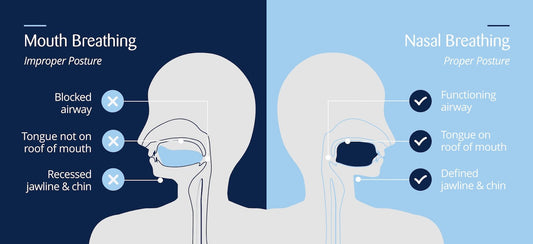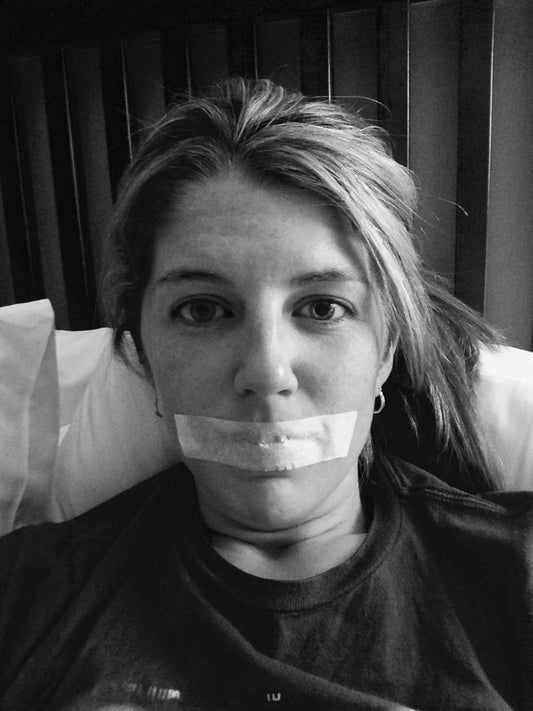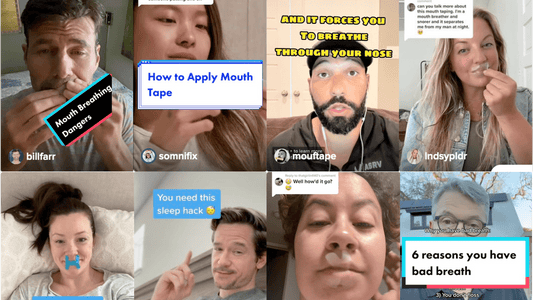You may have heard of taping your mouth closed before bed to prevent snoring and encourage nose breathing.
But is blocking your lips really safe or wise? Mouth taping does come with some caveats. By addressing common myths and proper usage, you can tap safely.
Common Myths
First, let’s dispel some mouth taping misconceptions floating around and look at proven realities:
Myth# 1: Mouth taping cuts off oxygen intake.
Reality: Using porous medical tape like the SomaBody Mouthtape allows normal nasal airflow. Studies show oxygenation actually improves with nasal breathing.
Myth #2: You could choke or suffocate from mouth taping.
Reality: Your nasal airway remains fully open, so suffocation isn't a risk. Simply remove the tape if you feel any panic.
Myth #3: Your body needs to breathe through the mouth while sleeping.
Reality: You can meet full oxygen demands breathing through the nose. Mouth breathing at night isn’t necessary nor healthy.
Myth #4: Mouth taping causes sleep apnea.
Reality: Mouth breathing worsens apnea while nasal breathing with mouth taping helps. Research has shown that mouth taping actually reduces apneic episodes in cases of mild sleep apnea.
How to Mouth Tape Safely
Now that those major myths are busted, let's discuss how to mouth tape safely.
Use Proper Tape
Never use strong adhesive tapes like duct tape. Opt for porous, breathable medical tape like the SomaBody MouthTape. Avoid latex if you have allergies.
Keep Lips Moisturized
Apply lip balm during day to prevent chapped lips from taping. Avoid petroleum-based products which could loosen tape adhesion.
Check for Skin Irritation
Watch for redness, irritation, or rashes around the lips indicating possible allergy. Discontinue use if this occurs.
Remove Carefully
Gently peel medical tape off in the morning. Don’t rip it off forcefully to avoid damaging skin.
Allow an Adjustment Period
It takes most people several weeks of persistence to adjust to taping. Be patient and disciplined.
When Should Mouth Taping Be Avoided?
Mouth taping may be inappropriate in certain situations:
- If you suffer from severe sleep apnea - we recommend you use mouth taping in conjunction with CPAP in this case
- If you have respiratory illness or breathing impairment
- If you have claustrophobia or extreme anxiety about mouth covering
- If you have very sensitive skin prone to irritation from adhesives
Always get extra opinions with your doctor first. And stop immediately if you experience any worrisome side effects or discomfort.
Tips for Safe, Successful Mouth Taping
Here are some best practices for effective, problem-free mouth taping:
- Use porous medical tape strips like the SomaBody Mouthtape
- Apply to dry, freshly washed skin
- Press firmly but avoid excessive pressure
- Initially try taping during day naps
- Persist for 2-4 weeks to adjust to the sensation
Mouth taping does require some precautions and an adjustment period. But when used properly and for appropriate reasons, it can safely improve sleep and breathing. With time, it should feel comfortable and normal overnight.
The key is dispelling myths, avoiding situations where taping is ill-advised, and implementing it carefully until your body adapts. Addressing concerns upfront allows you to mouth tape safely on your path to better sleep.




